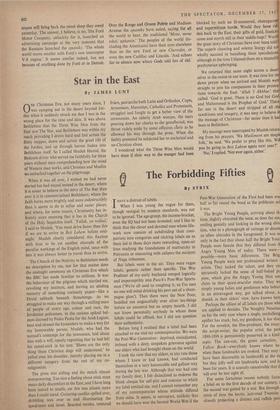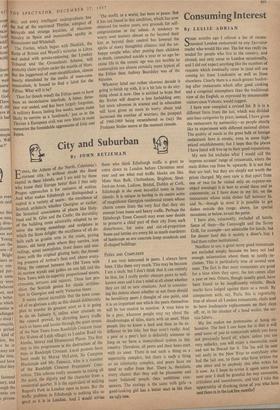The Forbidding Fifties
By STRIX T HAVE a distrust of labels.
I When I was young the vogue for them, though vestigial by modern standards, was not to be ignored. The age-group, the income-bracket, even the IQ had not been invented; and I like to think that the clever and devoted men whose life- work now consists of subdividing their com- patriots into categories and sticking labels on to them led in those days more rewarding, open-air lives studying the foundations of matriarchy in Polynesia or measuring with calipers the occiputs of Naga tribesmen.
But labels were in the air. They were vague labels, generic rather than specific. The War Profiteer of my early boyhood merged logically and imperceptibly into Punch's Post-War Sports- man (We're all used to roughing it, so I'm sure no one will mind drinking his port out of a cham- pagne glass'). Then there were the New Poor, huddled not ungracefully over silver tea-things before an ancestral but an empty hearth. I did not know personally anybody to whom these labels could be affixed, but I did not question their authenticity.
Before long I realised that a label had been attached to me and my contemporaries. We were the Post-War Generation : deprived, maladjusted, imbued with a deep, unspoken grievance against our elders who had brought chaos on the world.
I took the view that my elders, at any rate those whom I knew or had known, had conducted themselves in a very honourable and gallant way during the late war. Although that war had cost my family dear, I felt disinclined to endorse the blank cheque for self-pity and rancour to which my label entitled me, and I cannot remember any of my contemporaries whose attitude differed from mine. It seems, in retrospect, unlikely that we should have won the Second World War if the Post-War Generation of the First had been eve half as far round the bend as the publicists sai it was The Bright Young People, arriving about th time, slightly obscured the issue, as does the ma] smiling genially and looking in the wrong dire tion, who in a photograph of carnage or disastt so often obtrudes in, the foreground. It was nt only in the fact that about half the Bright Your People were female that they differed from tt Angry Young Men of today. There were- possible—more basic differences. The Brig' Young People were not professional writers artists. They lacked the talent, and they co spicuously lacked the sense of half-baked pu pose, which give the Angry Young Men son claim to their quasi-oracular status. They we simply- young ladies and gentlemen who behav in an extravagant way, got talked about, a: should, in their elders' view, have known bett Perhaps the silliest of all labels are those whi are applied to decades. The Naughty Nineties so far the only case where a single, unchalleng epithet has stuck; but, my goodness, it has stuc For the novelist, the film-producer, the essay: the script-writer, the popular artist, the peri 1890-1899 is permanently preserved in a kind aspic. The can-can, the green carnation, Yellow Book—everybody knows where he when these landmarks are evoked. They may i have been discernible as landmarks at the tit but they jolly well are landmarks now, and h] been for years. It is scarcely conceivable that tl will ever be lost sight of.
For some fortuitous reason nobody taste] a label on to the first decade of our century, t the second was gutted by a war. But through mists of time the hectic, jazz-mad Twenties already projecting a distinct and raffish pers rid nkin• iould told? J not tions, nchly desert
Dr the
ality; and every intelligent undergraduate has the feel of the equivocal Thirties, compact of betrayals and strange loyalties, of vicarious chivalry in Spain and inexcusable apathy in Westminster and Whitehall.
The Forties, which began with Dunkirk, the Battle of Britain and Wavell's victories in Libya and ended with potato-rationing, the Lynskey Tribunal and the Groundnuts Scheme, will Probably claim asylum under the mantle of Mars. But the juggernaut of over-simplification, almost hourly stimulated by the media of mass-com- munication, is bound to find a label for the Fifties. What will it be?
Thus far (touch wood) the Fifties seem to have been an inconclusive interlude. A bitter, three- Year war ended, and has been largely forgotten. A military fiasco, lasting five weeks, seems more likely to survive as a 'landmark,' just as in the Thirties a European civil war now blurs in most memories the formidable aggressions of Italy and Japan. The world, as a world, has been at peace. But it has not found in this condition, which has now obtained for twelve years, any grounds for self- congratulation or for solace. A tendency to worry over matters almost as far beyond their ken as beyond their control has lowered the spirits of many thoughtful citizens; and the un- happy couple who, after putting their children to death, committed suicide a year or so ago be- cause life in the atomic age was too terrible to contemplate are almost certainly more typical of the Fifties than Aubrey Beardsley was of the Nineties.
Whatever label our rather ulcerous decade is going to finish up with, it is a bit late to do any- thing about it now. One is entitled to hope that the Sixties will deserve a less forbidding one; but since advances in science and in education will have given us more to worry about and increased the number of worriers, the prospect of 1960-1969 being remembered as (say) the Frabjous Sixties seems at the moment remote.



























 Previous page
Previous page